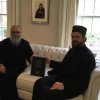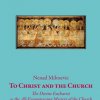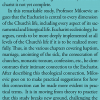His Beatitude remains mindful of the situation in the Serbian province of Kosovo and Metohija, and the difficult circumstances which our Serbian Orthodox brothers and sisters endure there. Bishop Maxim pledged his continuing support to all of our suffering brothers and sisters in the Middle East, and to all those who still remain as refugees from their hearths and homes.
Sidebar
Site Map
A great man is one who collects knowledge the way a bee collects honey and uses it to help people overcome the difficulties they endure - hunger, ignorance and disease!
- Nikola Tesla
Remember, remember always, that all of us, and you and I especially, are descended from immigrants and revolutionists.
- Franklin Roosevelt
While their territory has been devastated and their homes despoiled, the spirit of the Serbian people has not been broken.
- Woodrow Wilson







